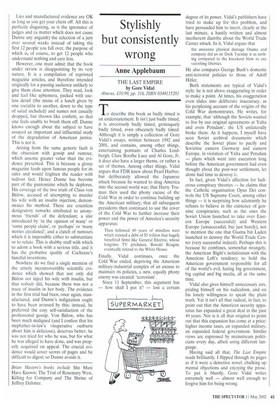Stylishly but consistently wrong
Anne Applebaum
THE LAST EMPIRE by Gore Vidal Abacus, 170.99, pp. 316, ISBN 0349115281 To describe this book as badly timed is an understatement. It isn't just badly timed, it is atrociously badly timed, grotesquely badly timed, even obscenely badly timed. Although it is simply a collection of Gore Vidal's essays, written between 1992 and 2001, and contains, among other things, entertaining portraits of Charles Lindbergh, Clare Boothe Luce and Al Gore, Jr, it does also have a larger theme, or rather a set of themes. Among other things, Vidal argues that FDR knew about Pearl Harbor, but deliberately allowed the Japanese attack because he wanted to drag America into the second world war; that Harry Truman then used the phony excuse of the Cold War in order to continue building up the American military; that all subsequent presidents then continued to use the cover of the Cold War to further increase their power and the power of America's security apparatus: Then followed 40 years of mindless wars which created a debt of $5 trillion that hugely benefited firms like General Electric, whose longtime TV pitchman, Ronald Reagan, eventually retired to the White House.
Finally, Vidal continues, once the Cold War ended, depriving the American military-industrial complex of an excuse to maintain its policies, a new, equally phony enemy was created: 'terrorism'.
Since 11 September, this argument has — how shall I put it? — lost a certain degree of its power. Vidal's publishers have tried to make up for this problem, and have persuaded him to insert, clearly at the last minute, a hastily written and almost incoherent diatribe about the World Trade Center attack, In it, Vidal argues that
the awesome physical damage Osama and company did us on Dark Tuesday is as nothing compared to the knockout blow to our vanishing liberties.
He also compares George Bush's domestic anti-terrorist policies to those of Adolf Hitler.
Both statements are typical of Vidal's style: he is not above exaggerating in order to make a point. At times, his exaggeration even slides into deliberate inaccuracy, as his perplexing account of the origins of the Cold War demonstrates. He writes, for example, that 'although the Soviets wanted to live by our original agreements at Yalta and even Potsdam', the US unilaterally broke them. As it happens, I myself have seen Soviet archival documents which describe the Soviet plans to pacify and Sovietise eastern Germany and eastern Europe, in violation of Yalta and Potsdam — plans which went into execution long before the American government had even thought about the post-war settlement, let alone had time to destroy it.
In fact, given Vidal's affection for ludicrous conspiracy theories — he claims that the Catholic organisation Opus Dei controls the US Supreme Court, among other things — it is surprising how adamantly he refuses to believe in the existence of genuine conspiracies, such as the ones the Soviet Union launched to take over Eastern Europe (successful) and Western Europe (unsuccessful, but just barely), not to mention the one that Osama bin Laden launched to destroy the World Trade Center (very successful indeed Perhaps this is because he combines, somewhat strangely, the American Right's isolationism with the American Left's tendency to hold the American government responsible for all of the world's evil, hating big government, big capital and big media, all at the same time.
Vidal also gives himself unnecessary airs, priding himself on his radicalism, and on his lonely willingness to speak the plain truth. Yet it isn't all that radical, in fact, to point out that the American security apparatus has expanded a great deal in the past 40 years. Nor is it all that original to point out that this expansion has come at a price: higher income taxes, an expanded military, an expanded federal government. Similar views are expressed by mainstream politicians every day, albeit using different language.
Having said all that, The Last Empire reads brilliantly. I flipped through its pages as if it were a detective novel, chalking up mental objections and enjoying the prose. To put it bluntly, Gore Vidal writes extremely well — almost well enough to forgive him for being wrong.






































































 Previous page
Previous page